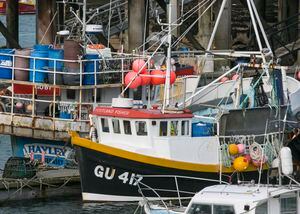UK 'trespassing on CI constitutional integrity' over fisheries
IN AN UNPRECEDENTED move, the UK Government has agreed to powers that would allow it to legislate for the Channel Islands over fisheries.

The move was revealed in an amendment discussed in the House of Commons on Tuesday which has been objected to by both Guernsey and Jersey – although not publicly ahead of the debate.
This all comes as Brexit talks enter a crucial phase tomorrow with the topic of access to waters at the heart of discussions, which have included claims that the UK is willing to compromise over quotas in Channel Island waters.
The Fisheries Bill is at its second reading and is designed to enable the UK to become an independent coastal state post-Brexit, with foreign fishing boats barred from fishing in UK waters unless licensed to do so.
But the major area of concern locally is a fresh clause that will allow the UK to legislate for the Crown Dependencies to ensure compliance with the UK's international obligations.
'I reassure Members and, indeed, the Crown Dependencies, that activation of the permissive extent clause* would only ever be used as a last resort and I am looking forward to continuing discussions with the Crown Dependencies on that in the next few days and weeks,' said Victoria Prentis, The Parliamentary Under-Secretary of State for Environment, Food and Rural Affairs in debate.
Justice committee chairman Bob Neill said that both Guernsey and Jersey objected to the clause being included.
'It is truly unprecedented for the Government to insist upon a permissive extent clause without the agreement of the relevant Crown dependencies. Why, even in an emergency, go down this rather provocative step? Why not wait until such time as an emergency arises and let them legislate, as they have indicated they would?' he said.
Ms Prentis responded: 'The Government feel that it is important, given that these are significant matters of international law, that we retain the ability to legislate for the Crown Dependencies if they do not show the inclination to do so when needed. We very much doubt that this will be necessary. I am sorry that they are upset by this stand, but I do feel that it is the right thing to do in the circumstances at the moment.'
The Isle of Man has consented to the clause.
Discussions go back to July, according to Mr Neill.
'They politely said, “No, thank you. We have a good relationship with our neighbours in France”—that is where the vast bulk of their catch lands—“and if we have difficulties we have our own legislative processes, and we will work and legislate for ourselves in an emergency if need be.” So I do not see the constitutional justification for the Government taking these powers,' he said.
'I had a concern—the Minister will know this—about our taking what many of us thought to be pre-emptive powers in the UK internal markets Bill. In the end that was described as a “break glass in emergency” clause. I do not know whether this is supposed to be a “break glass in emergency” clause, but it seems to suggest the possibility of the UK Government trespassing on the constitutional integrity of the Crown Dependencies, in furtherance of a potential dispute between the UK Government and the Crown Dependencies.'
He said there needed to be a rethink as he warned that the islands could take legal action against the UK Government.
Policy & Resources president Gavin St Pier has said it is an oversimplification to say that the UK is seizing the opportunity to legislate for the Channel Islands without consent and he would issue a statement shortly.
*A permissive extent clause is a provision that empowers the Queen in Council to extend some or all of the provisions of an Act of Parliament to one or more Crown Dependencies or Overseas Territories, normally subject to such modifications as may be specified. Section 384(1) of the Armed Forces Act 2006 is a typical example.





